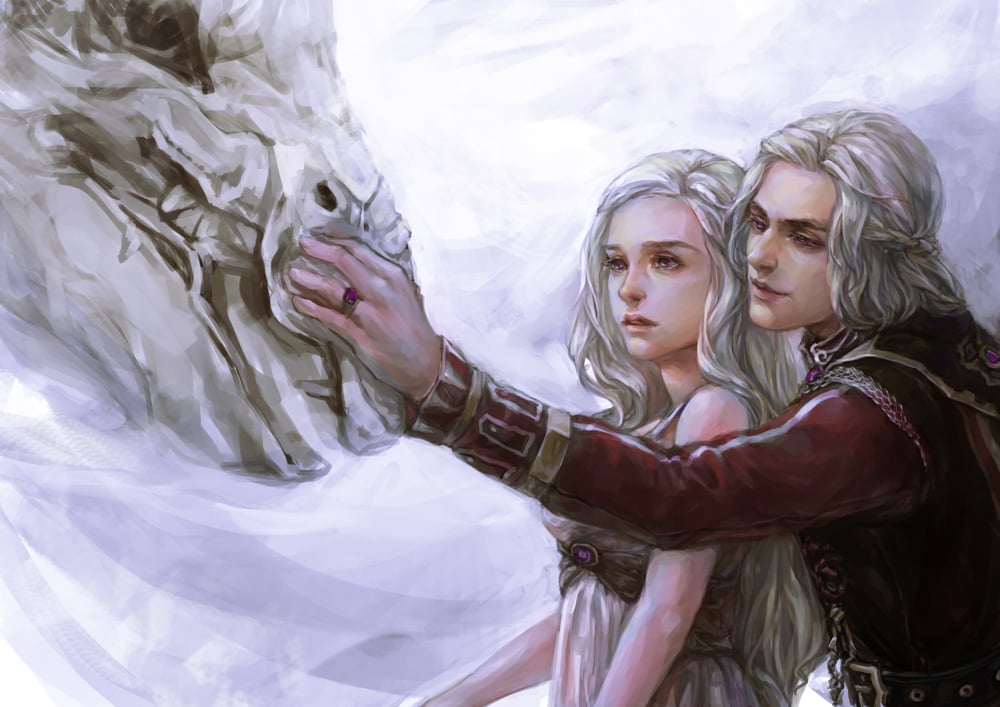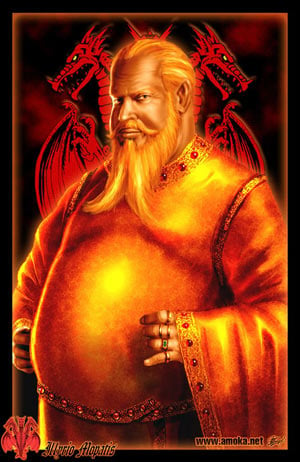Synopsis: Across the Narrow Sea we meet Daenerys Targaryen, second last child of the Mad King Aerys. She is currently residing in Pentos with her brother Viserys who is the heir to the Targaryen dynasty under the care of the scheming Illyrio Mopatis. Here we learn firstly that Daenerys and her brother were whisked away on the eve of the fall of their families ancestral stronghold in the aftermath of the past civil war and fled to the Free Cities under the care of Sir Willem Darry, a Targaryen loyalist who kept them safe and cared for them until he expired. Following that they were forced to roam the Free Cities as virtual beggars selling the last bits of their heritage to feed themselves and keep the company of the various merchant princes. Finally it seems Daenerys scheming brother will have his chance as Illyrio promises to connect him with an army led by the fearsome Dothraki leader Khal Drogo.
 |
| Credit to aprlilis 420 |
What do we learn?
Culture:
Well this chapter is not necessarily one which really indulges us in the culture of the Free Cities, it does give us a few important insights and one interesting comparison between ideas of slavery in Essos and those in Westeros.
Firstly a remark about slavery. In Essos it is plainly clear that the selling of people like chattel is commonplace. Slavery is seen as nothing to be remarked upon and as a clear continuation of the natural order of things. This is most likely inherited in the Free Cities from the slaving ways of the Valyrian Freehold, but more on them later.
 |
| Credit to Other in Law |
We can get a clearer view of just how casual the state of slavery in the Free Cities is by Illyrio's remarks regarding Jorah Mormont's exile from Westeros:
"The Usurper wanted his head." Illyrio told them. "Some trifling affront. He sold some poachers to a Tyroshi slaver instead of giving them to the Night's Watch. Absurd law. A man should be able to do as he likes with his own chattel."This really speaks to the casual attitude that most have towards slavery in the Free Cities and one which is rather appalling to both our 21st century sensibilities and those of the Westerosi. It does help cement that there is a real divide between Westeros and the Free Cities, showing us the very different cultural background that each nation comes from.
We also get a look at the Dothraki that we don't get a look at again. It's an interesting and very often overlooked point of their personality and culture.
Here we see Khal Drogo in an expansive manse living it up like a rich Pentoshi merchant surrounded by political and economic figures from all over the Free Cities. He has men from all over in attendance at his lavish party and seems to be playing the part of a good host. Contrast this with his warrior persona from later in the novel and see just how much it contrasts with his very political appearance here.
If I'm being honest this always baffles me on read throughs since it is really never mentioned again. I mean we see his expansive manse in Vaes Dothrak but we don't really see him interacting with political figures and merchants like he's a great prince again. He almost seems to switch between his city persona and the persona of a fearsome khal. It's intriguing while at the same time mildly confusing.
Though there is a probably a good reason for this if we look at Dothraki culture over all, but its a point which is sadly never really elaborated upon, though we do get suggestions of having separate cultural lives.
Finally culture wise I have to say that this is some of the finest world building GRRM packs into a few paragraphs in a while. We see a completely different culture, attitudes, and religion neatly placed between the pages. It's an early establishment of those who worship R'Hillor and of the casual slavery of the Free Cities, all points which will come into play later on!
Political:
There is not too much to be gleaned politically here I'm afraid. Though there are a number of good notes to take.
One is that we see that Robert sits on the throne having taken it from Mad King Aerys (more on ideas about the legitimacy of that later) and here sit the last descendants of House Targaryen living in exile reminding us that there is another side to the civil war and its very human.
 |
| Credit to ntaq-d60jdwu (deviantart via Google) |
The other note is the beggining of the long arc of Dany's story. Sold as a child to make way for a marriage alliance which will hopefully win Visery's back his throne. This is of course all a part of a massive Illyrio/Varys conspiracy (which I personally maintain is to put a Blackfyre pretended on the throne) and is arranged to further their ambitions (though more on this particular tid bit later). Based on some of Viserys words (and later information from the books) we do get a little insight how some of the Great Houses (like the Martells) and lesser Houses (like Darry) still maintain some loyalty to the old Targaryen dynasty. This of course may have much greater implications down the line.
Sadly we don't get a great look at the politics of the Free Cities (though it seems the Red Priests are even here being set up as a powerful religious/political force in Essos even here) but we do see one thing worth great note.
Like the barbarian hordes of old the Free Cities seem to find it far more preferable to pay off the Dothraki khalasars than fight them. They basically ransom their cities rather than risk economically ruinous war between them and the khalasars, which to me is mildly interesting.
Character:
This chapter is nice and instructive really as it gives us our first true look at what Dany used to be. Now don't get me wrong yes this is how she is now but almost immediately after she begins some rather exponential character growth. This is truly the first and last time we see the meek and bullied Dany who is always afraid of her brother and living in constant fear of his wrath and rather creepy sexual advances on her person. Afterwards she is a woman who is growing and getting used to power.
Quite honestly aside from Sansa I think Dany has probably the most prolific character growth in AGOT.
Now looking at Viserys we can see that he is in truth little more than an entitled and bitter man. His throne which he had been promised at a young age is stolen from him by rebels and usurpers, his family murdered, and all he had stolen from him as he is forced to live as a fugitive on the run from assassins. Due to this (and the death of his mother while birthing Dany) he is mean spirited, spiteful, vindictive, and has an inflated sense of self-worth to deal with the issues that lay before him.
In his head he paints a fantasy world where the people of Westeros await his return like that of a Messiah and he's been painting this picture in his head for so long that it has become reality, and anything that interferes with his reality is a burden and an enemy which needs to be cast down or aside. Nothing Dany says and none of the solid advise Illyrio gives is taken and he proves time and time again that he has to have things his way, even if that isn't realistic. He is paranoid of knives in the dark from the Usurper and is constantly running, his paranoia probably informs even more of his personality than his bitterness.
We don't get much of a look at Illyrio here because he hides any of his true nature behind a the facade of a boot licker and a flatterer who says sweet words to worm his way into the good graces of everyone he meets. Dany most likely sums it up best when she says:
"...she mistrusted Illyrio's sweet words, as she mistrusted everything about Illyrio."
That dear Dany is a good stance to take.
 |
| Credit to Amoka |
There is also Ser Jorah Mormont, but we shall have a chance to get to know him much better as the series goes on.
Finally the last principle character we meet in this chapter is Khal Drogo, a great Dothraki khal commanding a khalasar 40,000 strong and is a man of both manses and silks and war and horses. I'll return more to him later though.
Historical:
There are many historical comparisons I could make here. Firstly I would probably compare the Free Cities themselves to the post-Roman cities throughout the Western Roman Empire in the long slow collapse of Roman authority, but more specifically you could probably compare them to the city states of Italy. I'll return more to this comparison later though since there is a much juicier world to look into.
Then we have a comparison for the Dothraki. The Huns spring to mind first and foremost, but the Dothraki have similar culture and status to everything from the Mongols to the Comanche. They're more of a stand in for the horse riding nomadic warrior cultures which haunted European memory all the way to 1200 with the aborted Mongol invasion.
Here in Pentos though we get big similarities to the Huns under Atilla as they rampaged across the Eastern Roman Empire. You see way back in 440 AD when the Western Roman Empire hadn't totally collapsed and the Eastern one was still on the rise Atilla and the Huns decided they wanted to open up Roman markets to Hunnish traders, they had arranged a treaty with Eastern Emperor Theodosius who had agreed to open markets and give the Huns tribute money in exchange for peace. When Theodosius reneged on this treaty in 441 to fight a war in Africa the Huns brought war to his doorstep. Sacking cities and forts they rampaged through the Balkans even making it to the great double walls of Constantinople, which they could not breach.
Having been defeated by the Huns in battle and with them rampaging with impunity outside his capital Theodosius was forced to pay a staggering sum of money in the form of 2000 pounds of gold with a yearly tribute being double to 2100 pounds of gold to keep the peace.
This still didn't stop Atilla from later returning and sacking his way through the Eastern Roman Empire in 450 and despite the fact he was defeated then he had to be paid off again.
Perhaps the Magisters of Pentos are on to something when they figure it's far cheaper to pay off the Dothraki than to fight them hmm?

No comments:
Post a Comment